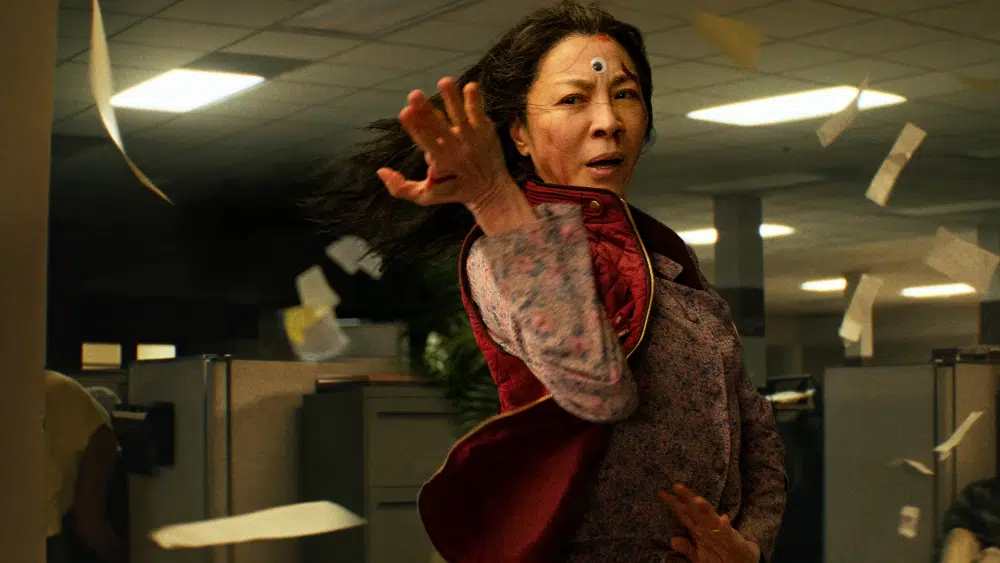Kung Fu Panda is one of the highest-grossing martial arts film franchises. Does Jack Black get a pass for portraying an Asian character?
Kung Fu Panda 4 was released earlier this month to critical success, bringing the franchise to $2 billion at the box office. Reviews were generally quite positive, with the fourth entry in the series achieving a respectable 86% on Rotten Tomatoes’ audience score.
It’s been over a decade since the world was introduced to Po in 2008’s Kung Fu Panda and eight years since the last iteration, Kung Fu Panda 3. Four films later, Kung Fu Panda features the biggest roster of Asian actors yet, including Awkwafina, Ronny Chieng, Ke Huy Quan, Lori Tan Chinn, and of course, James Hong. But with Jack Black as the star of the film, the question remains: is success still hinging on a white lead?
There’s no doubt that Jack Black is crucial to the franchise. This concept of centring a franchise on one actor isn’t new either. Pirates of the Caribbean isn’t Pirates of the Caribbean without Johnny Depp. Indiana Jones isn’t Indiana Jones without Harrison Ford. Kung Fu Panda isn’t Kung Fu Panda without Jack Black.
Read more: James Hong Disappointed By ‘Awfully Low’ Percentage of Asian Americans Getting Film Roles
And let’s be honest, Jack Black overshadows his castmates in every Kung Fu Panda. As much as we love the Asian actors in Kung Fu Panda, Jack Black’s performance is simply unparalleled. Unconvinced? Just look at the top five highest-grossing martial films of this century; three of the five are Kung Fu Panda films:
- The Matrix Reloaded (2003) – $741.8 Million
- Kung Fu Panda 2 (2011) – $665.7 Million
- Kung Fu Panda (2008) – $631.7 Million
- Kung Fu Panda 3 (2016) – $521.2 Million
- The Last Samurai (2003) – $456.8 Million
So why can’t an Asian actor carry a presence as strong as Jack Black? Well, some have tried.
Jack Black vs Michelle Yeoh
Let’s get this out of the way first: yes, we’re fully aware that Kung Fu Panda is a children’s animated full-length feature film and The Brothers Sun is a live-action TV series. You could say they’re different animals completely (no panda pun intended). But isn’t it curious that the franchises, both rich in Chinese culture and martial arts, carried by Hollywood names, have varied so broadly in success?
What’s more, both feature considerable heavyweights in terms of Hollywood names. Let’s not forget that Michelle Yeoh won an Oscar for her role in Everything Everywhere All At Once. Where’s your Oscar, Jack?
The Brothers Sun even scored higher on Rotten Tomatoes than Kung Fu Panda 4, earning a 90% audience score. Despite its high rating, viewership dwindled rather rapidly on Netflix from 50.5 million to 11.5 million before it was axed for a second season. Yeoh said she was “heartbroken” over the decision.
Read more: “Heartbroken”: Michelle Yeoh Reacts to ‘The Brothers Sun’ Cancellation
So what’s the difference between Jack Black’s and Michelle Yeoh’s respective franchises? Perhaps The Brothers Sun took itself too seriously, even as a kung fu comedy series. Perhaps it was too niche, focusing too heavily on the underbelly of American Chinese street culture. Whatever the case, it simply did not appeal to a wide enough audience for long enough.
Jack Black vs Jackie Chan
An obvious Asian name that broke Hollywood is Jackie Chan. The Karate Kid is the seventh highest-grossing martial arts film, bringing in $359.1 million, whilst Rush Hour 2 is seventh with $347.3 million.
Jackie Chan’s name is certainly not less credible than Jack Black’s. But even the kung fu master loses out to the Tenacious D singer, on home turf nonetheless.
Read more: Quentin Tarantino says ‘Kung Fu Panda’ ripped off ‘Kill Bill’
You’ll also note that Chan’s highest-grossing kung fu films paired him with a Western counterpart. We see a theme emerging here.
Jack Black vs Whitewashing
In this day and age, starring a white lead in a film basking in Asian culture is a risky play. Although Tom Cruise managed to get away with it in The Last Samurai, which somehow became the fifth highest-grossing martial arts film, it’s far too taboo to try it nowadays. Just look at The Great Wall’s epic fail. And that was helmed by a Chinese director too.
Read more: FILM REVIEW: The Great Wall – China and America’s great waste of an opportunity
Why then, is Jack Black given a pass? For starters, Jack Black has sincere respect for Chinese culture, and whilst his character is in itself a mockery of martial arts traditions, it’s done tastefully and written in such a way that the audience is laughing at Po’s struggle rather than the culture. Po might be the hero but his respect and admiration for traditional culture are felt and shared by the audience.
However, the real success is in Jack Black being Jack Black. He’s essentially a franchise in himself. We’re not being facetious here either. From Po’s mannerisms to his language style to his humour, the animated panda is an embodiment of Jack Black.
On the surface, Po is an Asian character (he’s a panda after all) voiced by a white actor. But that’s not completely true here. Po is Jack Black voiced by Jack Black.
It’s a unique situation, even for Hollywood. Few actors are privileged and talented enough to be cast to play themselves on screen. Even fewer carry this through animated media.
Finding the Chi
Like Chi itself, finding balance is important in everything we do. This is true for Hollywood’s approach to martial arts films too. By now, martial arts film fans are probably screaming at the screen about how Kung Fu Panda can’t be classed in the same tier as kung fu classics such as Enter The Dragon and Ong Bak. Don’t worry, we agree with you. In fact, we even did a tribute feature to Bruce Lee’s classic film to commemorate Chinese New Year this year.
Read more: Enter the Year of the Dragon: Remembering Bruce Lee’s Classic on Chinese New Year
But as much loved as they are by the community, they simply cannot hold a candle to the blockbusters listed in the introduction. Don’t even bother Googling how much Enter The Dragon and Ong Bak grossed at the box office. We did it, and even with inflation, the figures are too embarrassing to post here.
Ultimately, martial arts is still a niche in cinema, as is Chinese culture. This is great for fans of the genre but for wider audiences, perhaps there needs to be an injection of Western influence. It’s not as simple as casting a white actor in a martial arts film and hoping audiences will be impressed, just ask Zhang Yimou. But it’s also not as simple as creating an Asian American martial arts series that only a small sector of Asians can relate to appreciate.
In Kung Fu Panda, Jack Black and his character serve as the gateway for wider audiences to access Chinese culture and martial arts, retaining respect for its intricacies. Perhaps Beef struck it the best so far. Although not a martial arts film, and not Chinese-influenced, its representation of Asian culture is paired with its raw representation of human nature that we all can relate to. (But even Beef might be getting whitewashed).
Read more: Is ‘Beef’ Getting a Second Season Without Ali Wong and Steven Yeun? Star-Studded Cast Rumored
To sum up, no, we don’t need white actors to create a wholesome, successful, accessible Asian culture-centric film. We just need to find a balance which appeals to wider audiences. Also, there’s only Jack Black anyway.









